
Director Peter Greenaway’s 1982 film The Draughtsman’s Contract is set in a bygone era (1690’s England, to be exact), and follows the exploits of the upper class, some of whom we meet at the outset as they’re attending a dinner party. Everyone is dressed elegantly, yet the various conversations we’re privy to are anything but graceful. There’s plenty of not-too-subtle sexual innuendo, and Mrs. Clement (Lynda La Plante) even tells a story from her childhood, about how her father, petrified of a fire breaking out in his posh estate, kept hundreds of water buckets in a small room to fight any potential blaze. During the course of the conversation, Mrs. Clement confesses that she and her brothers, when the need would arise, often urinated in these buckets. "Those buckets were filled before my mother died”, she says, “I expect them to be still there, with the same water of thirty years ago, I shouldn't wonder - mixed with a little of myself, of course. I used to pee like a horse. I still do”. As we see throughout The Draughtsman’s Contract, the 17th-century aristocracy, in spite of their titles and wealth, were not above scandal, intrigue, gossip, and, yes, even a little toilet humor. In an effort to win back the attentions of her estranged husband (Dave Hill), who is more impressed with his property than his family, Mrs. Herbert (Janet Suzman) commissions noted draughtsman and amateur artist Mr. Neville (Anthony Higgins) to create a series of landscape drawings of the family’s estate while her husband is abroad. Mr. Neville, who fears he may be called away by another employer at any time, refuses at first, only to agree when Mrs. Herbert succumbs to his demands that she, in turn, provide him with room and board for the duration, and meet with him privately each and every day for sexual favors. Though it causes her some emotional distress, Mrs. Herbert acquiesces. As for the rest of the Herbert household, Mr. Talmann (Hugh Fraser), the Herbert’s son-in-law, objects to Neville’s abrasive manner, while his wife - Mrs. Herbert’s beloved daughter – Mrs. Talmann (Anne-Louise Lambert), is agreeable to the situation. But as Mr. Neville draws, he notices several garments scattered around the grounds, all of which may point to the fact that Mrs. Herbert’s husband never made it out of town. In fact, he may very well have been murdered, and it’s anyone’s guess as to who it was that finished him off. The Draughtsman’s Contract is quite funny (along with the often-witty dialogue, there’s a recurring joke involving a naked man - painted head to toe to look like a statue - who appears in the background of numerous scenes), and the movie is also tastefully presented (Mr. Neville’s instructions to the household, telling them which portions of the estate they must avoid during the time he is drawing, are as precise as they are condescending). Then, when the potential murder mystery takes shape, the story grows a bit more complex, mostly because anyone and everyone, including Mr. Neville, had both opportunity and motive to kill Mr. Herbert. How it plays out was shocking, to say the least, and once all was said and done, I found The Draughtsman’s Contract to be a very satisfying motion picture experience. Rating: 9.5 out of 10 (buy it and watch it several times)
